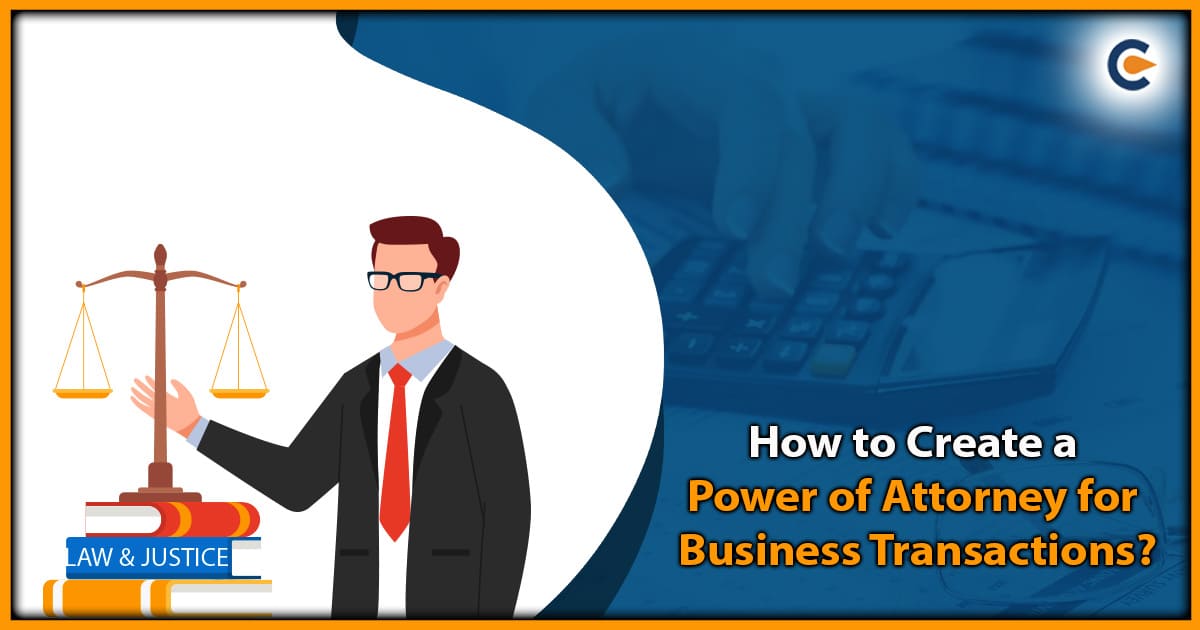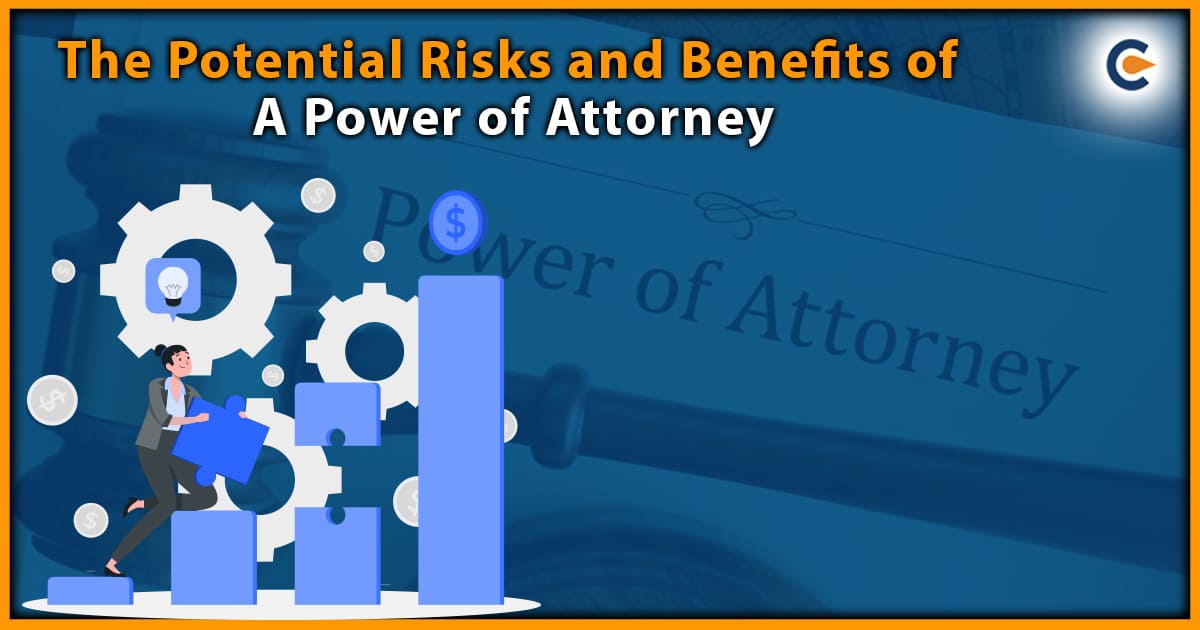A power of attorney, or POA, is a legal instrument that authorises an attorney-in-charge or legal agent to act on behalf of the principal. The attorney in charge has extensive or restricted power to act on the principal’s behalf.
A power of attorney is used when the principal becomes incompetent due to illness or disability. If the principal is unable to sign off on financial or legal transactions, the agent may act on his or her behalf. A POA may be created by anybody over the age of 18, and it’s a frequent starting point for persons who are ready to start formalising arrangements for their future.
When the originator dies, revokes it, or it is declared unlawful by a court of law, the power of attorney expires. A power of attorney also expires when its creator divorces a spouse named in the power of attorney, or when an agent is unable to continue carrying out the defined duties.
Types of Power Of Attorney
- General Power of Attorney
A general power of attorney gives an agent considerable authority to manage the business of a principal. The agent, or the person assigned to act on the principal’s behalf, has a number of responsibilities. The duties include purchasing or selling real estate as well as establishing business contracts on the principal’s behalf.
- Special or Limited Power of Attorney
Limited or special powers of attorney are the best options for someone who wants to restrict the agent’s authority. The extent of the agent’s authority must be specified in as much detail as possible before the limited power of attorney is signed and notarized. It is essential to consult a legal advisor if someone is unsure of what should be covered by the special power of attorney.
- Durable Power of Attorney
Only during the time when the individual wanted someone else to act on their behalf is the durable sort of power of attorney valid. A non-durable POA expires upon revocation or at the earlier of the set expiration date. In this situation, the principle would desire that the POA continue in effect even if he or she lost the ability to speak. A durable power of attorney can be used to specify, for instance, that the spouse should act as the agent if the principal falls unconscious. The POA grants the spouse authority to make choices even if the principal is unconscious.
- Healthcare or Medicine Power of Attorney
A person reserves the right to select the level of care they would like in the event that they become very ill. In the event of a life-threatening illness, a medical or health care POA allows the agent to make decisions on the principal’s behalf. Because they take into consideration the possibility that the person in question may be too ill to make their own decisions, the majority of health POAs fall under the durable category. Before selecting an agent in any of the aforementioned situations, the principal should consult with counsel. Additionally, it is important for the principal to have the attorney guide them through each stage of notarizing a power of attorney so that they are aware of what should be included in the document.
- Keep Your Affairs in Order While You’re Abroad as a Military POA
While they are gone at basic training or serving overseas, service members can choose someone to manage affairs at home for them. Because they may have restricted access to technology and may be unable to pay payments or manage their assets, this is frequently a must-do before shipping overseas.
This POA should expire along with their military enlistment contract.
Using the Power Of Attorney
The POA grants the attorney-in-fact (also known as “agent”) the authority to handle your affairs. Which affairs an attorney-in-fact may handle up until the contract’s expiration or your death depends on the type of POA you designate. Depending on whose POA you choose, the decision-making authority of an attorney-in-fact takes effect at various times. Before the POA procedure begins, the POA documents must be verified. POA documents are critical, and the principal should not presume that the documents obtained are of the proper type.
What May A Power Of Attorney Be Used For?
No power of attorney is enforceable in your state unless it is properly drafted, signed, and notarized. Additionally, for your Power of attorney to be enforceable in court, you must be of sound mind when you sign it.
Your POA documents might include any clarifications that you decide are necessary for certain terms. A lawyer’s[1] assistance might make the procedure simpler if you’re confused about how to proceed or the right language.
What Distinguishes A Power Of Attorney From An Attorney-In-Fact?
With a power of attorney, you may specify who will handle your business in your absence, under what conditions, and with what particular instructions.
A person you designate in a POA document as your attorney-in-fact will assist in managing your affairs once the POA becomes effective. Whether this is a short-term or long-term scenario, this individual will be your fiduciary and be in charge of making choices on your behalf.
An attorney-in-fact does not have to be a practising lawyer.
They must only be:
- 18 years old or older
- Of sound mind 18 years old or older.
How to Create a Strong Power Of Attorney
Taking steps to establish a POA is an important element of estate planning.
This is a seven-step procedure that consists of the following steps:
- Appointment of an attorney-in-fact
- Talking about obligations with the attorney-in-fact
- Choosing the best POA for your requirements
- Creating the Power of Attorney
- Ensuring that the POA is legally valid
- Filing it appropriately
- Making necessary modifications
Appointment of an Attorney-In-Fact
Your attorney-in-fact will be in charge of several critical choices while you are still alive. As a result, it is critical that you select someone who has your best interests in mind and is responsible, trustworthy, and a skilled communicator.
Many individuals consider this person to be a parent, an adult child, or a close family friend. Just keep in mind that if you pick a single family member, disagreements may develop. If you choose more than one individual, it may take longer for them to reach an agreement.
Designating More Than One Attorney-In-Fact?
You can appoint two or more attorneys-this is known as a dual power of attorney.
However, unless defined tasks are assigned to each agent, all agents must agree on every decision.
As a result, it’s normally advisable to choose one agent and only designate two if necessary. If this becomes essential, be certain that the two can operate well together.
Talking About Obligations with the Attorney-In-Fact
Asking for permission before appointing an attorney-in-fact is essential since not everyone wants to be given a POA. It’s necessary to consider carefully whether the individual you select is the right fit for the position.
Choosing the Best POA for Your Requirements
For those who require someone to make a variety of choices, a broad power of attorney is preferable.
Creating Power Of Attorney
The following information should be included in your power of attorney document:
- The date you formed the POA
- Start date and/or expiration date
- Your name and the name of the agent you have designated
- The extent of the attorney-in-fact’s powers
- A paragraph outlining your wishes
- Signatures from both you and your attorney-in-fact
Ensuring That the POA Is Legally Valid
Sign and execute your POA in accordance with state legal requirements to give it legal force. Typically, this entails notarizing or signing in front of witnesses. Think about giving a copy to your attorney-in-fact or letting them know where they may get one if necessary.
Along with these basic legal requirements, you should also be informed of the particular POA laws in your state, especially if you recently moved.
Filing It Appropriately
You must properly prepare the POA and keep it in a secure location, such as a safe deposit box at the bank. Just make sure your agent and family members are aware of its location.
Making Necessary Modifications
It’s completely likely that you will choose to revise your POA to account for changes in your life. It could be time to make changes if you lose contact with someone you used to speak to frequently, get married, take on a more dangerous profession, or your initial attorney-in-fact no longer seems appropriate.
Conclusion
A power of attorney (POA) is authority granted to an agent by the principal to make decisions on his or her behalf. The agent may be given limited or total authority to act on the principal’s behalf in matters relating to health, property, or financial choices. When a person is disabled and unable to make their own decisions, a POA is commonly used.
Read Our Article: Different Types Of Power Of Attorney And When To Use Them











